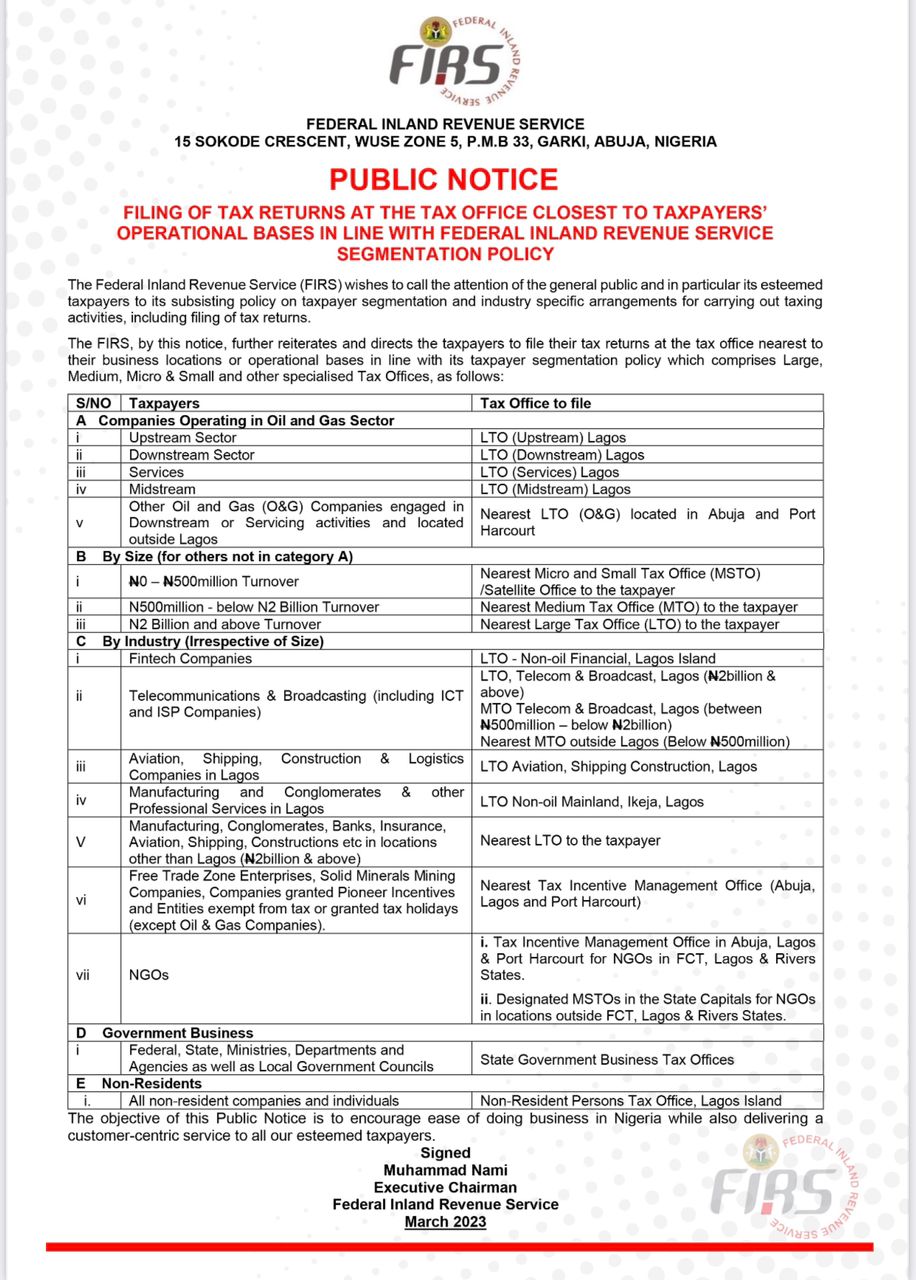By Salisu Na’inna Dambatta
It is akin to a revolution: welcome to the big paradigm shift in Nigeria’s tax collection. The shift is from consistently low, inadequate and below targeted tax collection to a record-setting collection of N10.1 trillion in 2022. And the trend of raking in more revenue to finance people-oriented projects continues.
Since his appointment as the Executive Chairman of the Federal Inland Revenue Service (FIRS) on 9th December, 2019, the country has witnessed and benefitted from his expertise in tax matters. This is unsurprising given his professional and career pedigree. As immediate past Chairman of the African Tax Administrators Forum (ATAF), Mr. Nami led the birth of a consciousness in the continent that technology was the future of taxation. He has carried that philosophy and campaign to the Commonwealth Association of Tax Administrators (CATA), where he has been President since 2021.
The Bayero University Kano graduate, Nami is a trained and skillful Tax, Accounting and Management Professional with high qualifications and professional practicing licences from relevant professional bodies. He has been in the business of Auditing, Tax Management and Advisory Management Services to diverse clients in the Banking, Manufacturing, Services, Public Sector and Non-Profit Organisations for around three decades.
He has transformed the revenue collection for Nigeria by deploying his vast experience, deep knowledge and patriotism to bear on his role as Chairman of the FIRS and Joint Tax Board.
The improved tax collection in the country since his assumption of office as Chairman of the Federal Inland Revenue Service (FIRS) to date is evidenced in Tax Statistics/Report the institution has released from 2020 to date.
Whereas the FIRS raked in N10.1 trillion in 2022, the highest ever so far; the same Service could only generate N3,741.7574 trillion out of a modest target total revenue of N4,572.2090 trillion in 2015. The total collection for 2015 at N3.714 trillion was the equivalent of slightly over one third of the 2022 collection.
Three years later in 2018, the revenue target for the FIRS was N6,747.0344 trillion.
However, that target proved ambitious as the Service was abled to generate only N5,320.8914 trillion that year. The total revenue for 2018 was just above half of the N10.1 trillion generated by Muhammadu Mami and his team in 2022.
While briefing the National Economic Council (NEC) recently, the top tax man attributed the high tax collection success in the first half year to three factors namely: improved voluntary tax compliance by taxpayers; the continued improvement of automation of tax administration processes, including the updated VAT filing processes; and strong engagement with stakeholders in both the formal and informal sectors of the economy.
He assured the NEC that, “the performance in the second half of the year would be better considering the continuing improvement to our tax administration processes.”
It is heartwarming that the January to June 2023 tax collected in the sum of N5.5 trillion is more than the entire collection of N5.320 trillion in 2018.
Also the N5.5 trillion was more than the target of N5.3 trillion set for the first six months of this year. And the FIRS joyfully celebrated it as the largest tax collected for any six months since tax collection started in Nigeria.
Muhammad Nami disclosed that the non-oil sector contributed more revenue than the oil sector, “Tax revenue collected from the oil sector from January to June 2023 stood at N1.73 trillion, as against a target of N2.3 trillion; while non-oil tax collection stood at N3.76 trillion, as against a target of N2.98 trillion.
“It is important to remember that he was appointed Chairman FIRS in December 2019. In that year, the revenue target was N8,802.3860 trillion. But the total collection for that year was below six trillion: it was N5,261.9163 trillion. There was a shortfall of over N3.5 trillion.
In 2020 his first full year in office, FIRS collected N4.95 trillion a shade below the target of N5,076.8518, at 98 per cent performance. It was achieved amidst a recession, the COVID-19 worldwide economic shutdown, low oil revenue and the economic disruptions caused by the EndSARS protests.
The NBS affirmed that the FIRS collected N6.405 trillion in 2021. The target for that year was N6.401 trillion. It was a 101 per cent success story. But it was triumphantly dwarfed by the N10.1 trillion best-ever collection so far achieved in 2022.
Salisu Na’inna Dambatta wrote from Dambatta town.































